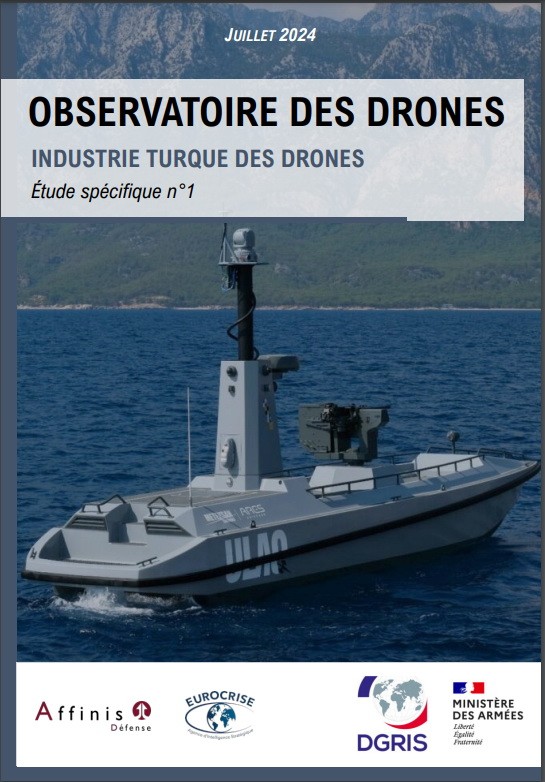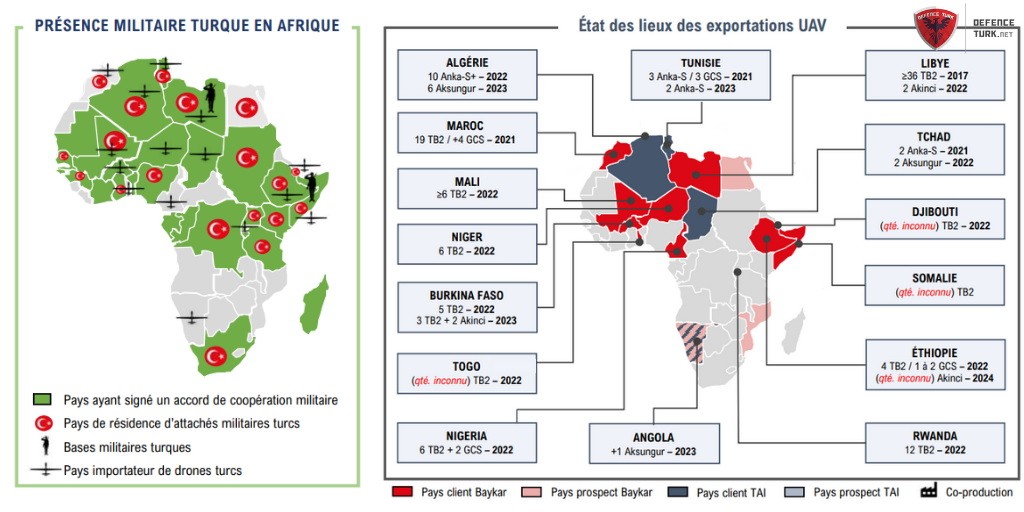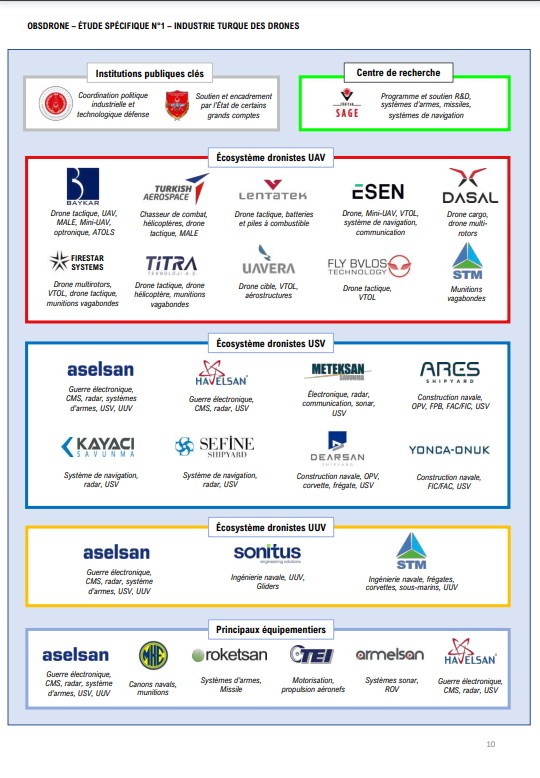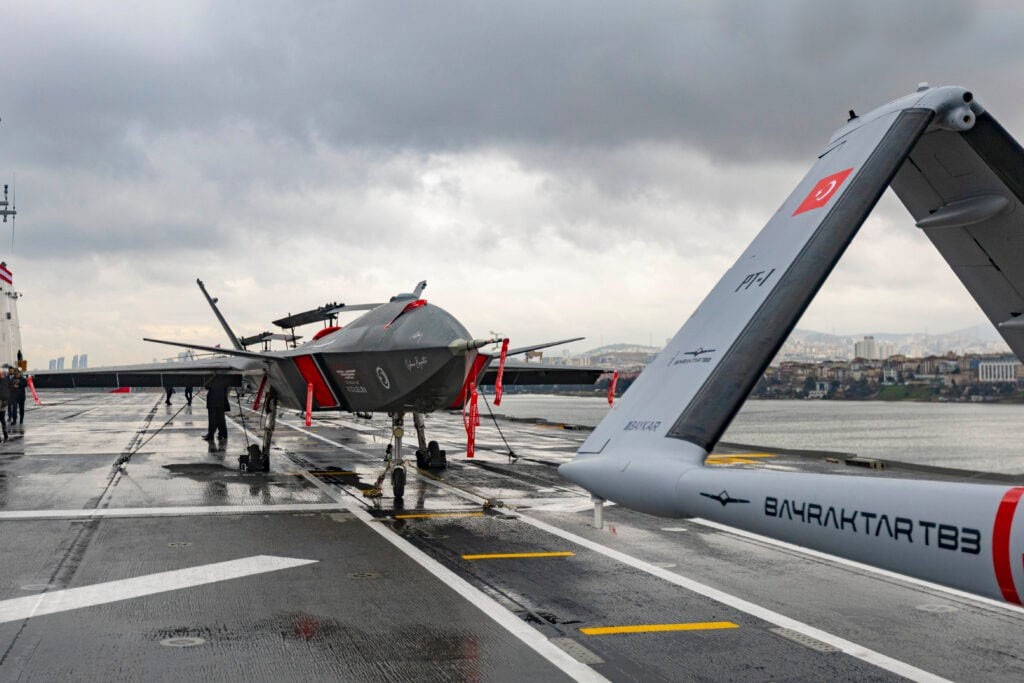BAKU, Azerbaijan, December 16. France has once again turned up the geopolitical heat with Türkiye, publishing a bombshell 65-page report titled “The Turkish Drone Industry.” Prepared by the Directorate General for International Relations and Strategy (DGRIS) under the French Ministry of Defense, the report’s timing and content read like a provocation more than an analysis. The year-end release of the report, finalized in July, has sparked a full-blown diplomatic storm between Paris and Ankara.
Türkiye’s reaction was swift and unequivocal. The Turkish Ministry of National Defense slammed the report as an outright hostile maneuver, labeling it a direct threat to national security. Particular outrage stemmed from the inclusion of satellite images pinpointing sensitive sites like Baykar's production facilities—the mastermind behind the iconic Bayraktar TB2 drones. Ankara didn’t just stop at rhetoric; it filed an official protest with the French embassy, demanding the report's immediate withdrawal from public access.
However, this is not merely an academic curiosity. France’s move represents a calculated geopolitical gambit in a world where Türkiye’s burgeoning defense industry has reshaped power dynamics in more ways than one.

Inside the Report: French Analysis, Turkish Realities
The DGRIS report, relying heavily on open-source intelligence (OSINT), delves into Türkiye’s drone ecosystem with surgical precision. Yet beneath its seemingly dispassionate tone lies a clear agenda: to undermine Türkiye’s position as an emergent force in defense technology.
1. From the Sidelines to the Spotlight: Türkiye’s Defense Renaissance
Even the French can’t deny it—Türkiye’s meteoric rise in drone technology is no fluke. Over the past decade, the country has pivoted from being a defense industry follower to a leader. The report grudgingly credits several factors:
R&D Investment: Türkiye’s state and private sectors have poured unprecedented funds into innovation, creating a tech ecosystem that punches above its weight.
Government Backing: President Erdoğan has turned defense into a national sovereignty project, ensuring political and financial support flows uninterrupted.
Localization Drive: Unlike many peers, Türkiye has focused on reducing reliance on foreign suppliers, creating a self-sustaining supply chain.
University-Industry Synergy: Close collaboration between academic institutions and private firms has supercharged innovation.
2. Bayraktar TB2: The Star Player
A significant chunk of the report zeroes in on Turkish UAVs, with the Bayraktar TB2 leading the pack. France acknowledges that these drones aren’t just technological marvels; they’re reshaping power equations, particularly in resource-strapped conflict zones. The next-gen Akıncı drones and other cutting-edge projects only underline Türkiye’s upward trajectory.
3. Exports: A New Diplomatic Arsenal
The numbers don’t lie: Türkiye has leveraged its drone industry to wield soft power with precision.
Explosive Export Growth: In just one year, Turkish UAV exports to Africa skyrocketed from $82.9 million in 2020 to $460.6 million in 2021.
Diverse Clientele: Morocco, Tunisia, Nigeria, and Ethiopia are among the growing list of buyers.
Cost-Effective Strategy: Türkiye’s drones offer a rare combination of affordability and efficiency, making them attractive for countries with tight defense budgets.
4. Game-Changing Diplomacy
Türkiye’s drones are no longer just military tools; they’re geopolitical assets. The report highlights Ankara’s ability to:
Dominate North Africa: Türkiye has emerged as a critical partner for African nations seeking affordable, reliable defense solutions.
Expand Influence in the Middle East: Turkish UAVs have played pivotal roles in regional conflicts, strengthening Ankara’s hand.
Forge Central Asian Ties: Cutting-edge tech on favorable terms has made Türkiye a preferred partner in Central Asia.

France’s Panic Button: What’s Driving Paris?
So, why is Paris so rattled? The answer lies in how Turkish drones have upended the global defense playbook.
1. Undermining French Interests
From North Africa to the Middle East, Turkish UAVs have shifted power dynamics in conflicts where France traditionally held sway. This isn’t just a technological rivalry—it’s a direct challenge to France’s geopolitical clout.
2. Africa: The New Battleground
Africa has long been a playground for French diplomacy and defense exports. But Türkiye’s rise threatens to erode this influence, offering African nations an alternative to France’s historically colonial footprint.
3. Competing on the Global Stage
Türkiye is no longer content to be a regional player. It’s stepping onto the global stage as a technological powerhouse, competing head-to-head with Western giants. For France, this is an existential challenge to its defense industry and its broader strategic ambitions.
The Bigger Picture: What’s Next?
The DGRIS report isn’t just a critique; it’s a warning. It underscores how Turkish drones have not only revolutionized modern warfare but have also become an extension of Türkiye’s foreign policy. The stakes are clear: France sees Türkiye’s ascent as a zero-sum game where Ankara’s gain comes at Paris’s expense.
But here’s the kicker: while France resorts to reports and rhetoric, Türkiye is out there rewriting the rules of the game. With every Bayraktar that takes off, Ankara is solidifying its position as a force to be reckoned with in the 21st-century defense industry.
In this clash of tech and geopolitics, one thing is certain—Türkiye’s drones have already won the first round. The question is whether France has the strategy to fight back, or if it’s destined to watch its influence dwindle in the face of Ankara’s relentless rise.
The Echo of the Future: A Diplomatic Storm or the Dawn of a Tech War?
The DGRIS report isn’t just a dossier—it’s a shot across the bow in what could escalate into a full-blown tech war. Framing Türkiye’s meteoric rise in the defense sector as a global threat, Paris aims to rally the international community against Ankara. But in its haste, France may have stumbled into an even bigger geopolitical storm.
For Türkiye, this report is more than an affront; it’s a clear challenge to its sovereignty and ambitions. Already under the microscope of Western powers, Ankara views the report as part of a broader strategy to curb its influence. Yet, the likely outcome is quite the opposite: this will only harden Türkiye's resolve to cement its status as a dominant player in global defense innovation.
In this unfolding drama, Turkish drones like the Bayraktar TB2 have become symbolic of a seismic shift in geopolitics. Access to cutting-edge technology and the ability to innovate are no longer luxuries but the definitive markers of a nation’s global standing.
Satellite Imagery: A Security Breach or Just "Analysis"?
The report’s use of satellite images—obtained via Planet Labs—has set off alarm bells in Ankara. Turkish officials see the inclusion of these images not as an academic exercise but as a calculated provocation and a dangerous precedent:
Pinpointing Vulnerabilities: Future conflicts could exploit the precise coordinates of strategic facilities, such as Baykar's production sites, as revealed by the imagery.
Erosion of Deterrence: Exposing critical infrastructure compromises Türkiye’s geopolitical leverage.
A New Norm? Publishing such data without consent raises the stakes for international norms around military and industrial secrecy.
Ankara wasted no time in denouncing the report, with Turkish Defense Minister Yaşar Güler delivering a stinging rebuttal:
“Disclosing information about our strategic facilities is a deliberate act undermining our national security and defense capabilities.”
Twrkiye has formally demanded that France withdraw the report from public access, framing the issue as a test of international norms and NATO solidarity.

Türkiye’s Counteroffensive: Diplomacy, Lawsuits, and Narrative Control
Türkiye is treating the report not as an isolated act but as part of a broader campaign to discredit its rising influence. Officials and analysts across the board have signaled a multi-pronged response.
1. Official Ankara: Calling Out Double Standards
The Turkish Ministry of National Defense has framed the report as a breach of sovereignty and an attack on international norms of cooperation. Key talking points include:
Breach of Trust: Exposing strategic facilities is not only a threat to national security but also a violation of the principles of allied cooperation.
French Hypocrisy: Paris criticizes Türkiye’s defense advances while ignoring its own hegemonic maneuvers, particularly in Africa and the Middle East.
Risk of Escalation: Sensitive data in the wrong hands could embolden Türkiye’s adversaries.
2. Legal Pushback
Turkish experts and officials are exploring legal avenues to challenge the publication of the report. Proposals include suing the entities involved in international courts and tightening domestic laws to safeguard strategic data.
Turkish analyst Hakan Karaca minced no words:
“This report violates not only international law but also the principles of good neighborly relations. It is an overt attempt to tarnish Türkiye’s global reputation.”
3. NATO and Alliance Dynamics
Türkiye has also taken its grievances to NATO, accusing France of undermining the alliance’s foundational principles. Ankara’s NATO envoy Osman Çelik issued a scathing critique:
“Publishing data that undermines the security of an ally contradicts NATO’s spirit and principles. We expect explanations and a change in approach from the French side.”
France’s Misstep: Strategic Analysis or Political Blunder?
Even within France, the decision to publish the report is sparking debate. Analysts and policymakers are divided on its merits and ramifications.
Political scientist Anne-Pierre Belmont described the move as shortsighted:
“Publishing such a report openly is reckless. It risks further escalation and worsening relations between two NATO allies.”
Meanwhile, military analyst Éric Fontaine defended the report’s content but acknowledged the tactical error in making it public:
“Türkiye’s rise as a defense powerhouse is a reality Europe cannot ignore. However, the decision to publish sensitive data was poorly calculated.”
The internal rift in Paris underscores a broader European uncertainty on how to engage with Türkiye’s rapid ascent.
Global Context: Why Türkiye’s Drones Are a Game-Changer
At the heart of this clash is Türkiye’s dramatic success in leveraging its drone technology as both a military tool and a diplomatic asset. The Bayraktar TB2 and its successors have redefined modern warfare, with implications that extend far beyond the battlefield:
North Africa and the Middle East: Turkish UAVs have shifted power dynamics in these historically contested regions, reducing reliance on traditional powers like France.
Central Asia: By offering cutting-edge technologies on favorable terms, Türkiye is strengthening its foothold in a region heavily influenced by Russia and China.
Africa’s New Partner: Ankara’s cost-effective drones have become the preferred choice for nations with limited defense budgets, eroding France’s traditional dominance on the continent.
These achievements haven’t just rattled the West—they’ve also rewritten the playbook for smaller nations seeking to punch above their
A Geopolitical Tech War
The DGRIS report signals more than just France’s unease with Türkiye’s defense industry. It marks the opening salvo in a broader geopolitical tech war, where drones and other advanced technologies are becoming the battleground for influence and power.
For Türkiye, the stakes couldn’t be higher. The backlash from France only reinforces Ankara’s determination to double down on its technological ambitions. In the words of a senior Turkish official:
“If this is their attempt to slow us down, it’s already failed. We’re just getting started.”
In this high-stakes game, the question isn’t whether Turkish drones will continue to soar—it’s whether France and its allies can keep up.
Diplomacy in the Crosshairs: A New Frontline in Geopolitics
The controversy surrounding the French report, “The Turkish Drone Industry,” is more than a diplomatic dust-up—it’s a vivid example of how information warfare is shaping the modern geopolitical landscape. Cloaked as research, the report exemplifies how data and analysis can be weaponized to advance strategic interests. For Türkiye, this incident is both a challenge to its sovereignty and a reflection of its rising stature on the global stage.
France has ventured into precarious territory, but whether Paris is prepared for Ankara’s countermeasures is a different question altogether. As Türkiye strengthens its global position, it is proving its readiness to defend national interests with every tool at its disposal—diplomatic, legal, and technological.
Satellite Imagery: Transparency or Security Breach?
At the heart of the controversy lies the report’s use of satellite imagery from Planet Labs, which zeroes in on Türkiye’s strategic facilities. For Ankara, this crosses a red line, raising critical questions about the boundaries of open-source intelligence (OSINT):
National Security at Risk: The inclusion of precise coordinates of defense infrastructure exposes Türkiye to potential threats in case of future conflicts.
Undermining NATO Trust: As a NATO ally, France’s actions are seen as an unprecedented breach of the alliance’s principles.
A Dangerous Precedent: Publishing sensitive data sets a troubling example for how open-source information can be leveraged against sovereign nations.
Türkiye’s NATO representative, Osman Çelik, underscored the gravity of the situation:
“The publication of data jeopardizing the security of a NATO member must be thoroughly discussed within the Alliance.”
While Ankara calls for a formal NATO evaluation, France’s silence on the matter has only deepened the trust deficit, with Turkish media framing Paris’s lack of response as an evasion of accountability.
A Tech War in the Making: Türkiye’s Symbolic Drones
This unfolding crisis is about more than just satellites and reports—it’s a battle for dominance in the defense technology arena. Turkish drones like the Bayraktar TB2 are no longer mere military assets; they’re symbols of a shifting world order where innovation dictates power.
The Domestic Backlash in Türkiye
The report has ignited widespread outrage across Turkish society, with media outlets and public figures rallying around the government. Leading publications such as Hürriyet and Sabah are framing the incident as a deliberate attempt to undermine Türkiye’s sovereignty.
Journalist Mehmet Yılmaz wrote in Milliyet: “If we allow such provocations to go unanswered, it will signal to the world that Türkiye can be targeted diplomatically and informationally without consequence.”
On social media, hashtags like #DefendTurkey and #BayraktarPride are trending, reflecting public solidarity and a demand for decisive action.
Ankara has outlined a robust, multi-layered response to counteract the report’s impact:
Legal Measures: Turkish officials are preparing lawsuits against the report’s authors and distributors, including contractors Affinis Défense and Eurocrise.
Diplomatic Channels: Türkiye plans to escalate the issue within NATO and the United Nations, framing it as a violation of allied commitments.
Enhanced Security Policies: The scandal has prompted Türkiye to review its protocols for safeguarding sensitive defense information.
Turkish Minister of National Defense Yaşar Güler affirmed Ankara’s resolve:
“We will not leave unanswered attempts to discredit and undermine our defense capabilities. Türkiye is determined to use every available means to protect its national interests.”
France’s Efforts to Save Face
Facing mounting criticism, the French Ministry of Defense has distanced itself from the report, claiming it reflects the views of contractors, not the government. A spokesperson stated:
“DGRIS is not responsible for the statements made in the report. These do not represent the official stance of the French Ministry of Defense.”
Under apparent government pressure, Affinis Défense and Eurocrise have removed the report from their websites. Yet this damage-control effort hasn’t silenced criticism within France.
Political scientist Anne-Pierre Belmont criticized the lack of oversight:
“This incident demonstrates a failure in transparency and accountability within DGRIS operations. Publications of this nature require rigorous vetting to avoid international scandals.”
Military analyst Éric Fontaine, however, defended the report’s intent while conceding its poor execution:
“Studying Türkiye’s drone technology is vital for the EU. But making sensitive data public was a clear miscalculation.”
Why Türkiye Is in the Crosshairs
Türkiye’s rapid advancements in drone technology have turned it into a disruptor in global power dynamics. The Bayraktar TB2 and its successors are redefining how nations exercise influence, sparking unease in traditional power centers like France.
Regional Impacts of Turkish Drones
North Africa and the Middle East: Turkish UAVs have become pivotal in conflicts, reshaping Ankara’s influence in regions long dominated by Western powers.
Central Asia: Türkiye’s tech diplomacy is fostering stronger ties with nations in Russia’s traditional sphere of influence.
Africa: Cost-effective and reliable, Turkish drones are challenging European arms exporters, particularly in nations with constrained defense budgets.
These successes haven’t just elevated Türkiye’s defense sector—they’ve also deepened anxieties in the West, where such technological disruption is viewed as a direct challenge to established hierarchies.
Diplomatic Fallout: A NATO at Crossroads
The report has opened yet another fissure within NATO, exposing tensions between Türkiye and France that go beyond the drone dispute. Ankara’s demand for alliance-level discussions places NATO in an uncomfortable spotlight, forcing it to confront the balance between unity and internal discord.
For Türkiye, the scandal is a double-edged sword: while it poses a direct challenge to its sovereignty, it also provides an opportunity to assert itself as a key player in global geopolitics.
The Road Ahead: An Era of Tech-Driven Power Struggles
The fallout from the DGRIS report underscores a larger reality—geopolitical rivalries are increasingly being waged in the tech arena. Drones like the Bayraktar TB2 are not just weapons; they’re instruments of influence that can shift regional and global dynamics.
For Türkiye, the lesson is clear: its rise as a technological powerhouse will not go uncontested. But if the past is any indication, Ankara will use this challenge to fortify its position on the world stage.
As the world watches this crisis unfold, one thing is certain: the era of tech-driven geopolitics has arrived, and Türkiye is firmly in the driver’s seat.
International Repercussions: Trust Erosion and Internal Divisions
The fallout from the publication of “The Turkish Drone Industry” report has rippled far beyond the French-Turkish diplomatic standoff, revealing deeper fissures within NATO and the broader international community. Media outlets and analysts worldwide have framed the controversy as emblematic of the fragility of allied trust and the growing competition in the arms market.
Global Media Perspectives
The Guardian speculated that the incident underscores internal discord within the French government, particularly in reconciling its foreign policy strategies. It criticized the lack of coherence in France’s approach to navigating challenges posed by both allies and competitors.
Der Spiegel warned that actions like these weaken France’s strategic position within NATO and the EU. By undermining trust among allies, such incidents could derail coordinated efforts to confront shared global challenges.
Russian Analyst Alexander Kramarenko characterized the report as a symptom of the "systemic flaws of Western defense contracting." He noted that adversaries like Russia could exploit the scandal to highlight the West’s inability to manage sensitive strategic data effectively.
Arms Market Competition: Türkiye vs. Europe
The scandal has exposed a simmering rivalry between Türkiye and European powers—chiefly France—in the lucrative and politically charged global arms market.
1. Türkiye’s Ascent as a Defense Powerhouse
Türkiye’s rapid rise in the production of unmanned aerial vehicles (UAVs) has disrupted traditional market dynamics. Manufacturers like Baykar, the developer of the Bayraktar TB2, are increasingly overshadowing European defense giants like Dassault Aviation and Airbus Defence and Space.
Türkiye’s Competitive Edge:
Affordability and Quality: Turkish UAVs offer cost-effective solutions without compromising on capability.
Combat-Proven Technology: Systems like the Bayraktar TB2 have demonstrated their effectiveness in real-world conflicts, enhancing their credibility among buyers.
Client-Centric Flexibility: Turkish manufacturers are adept at tailoring products to the specific needs of diverse markets, further boosting their appeal.
2. France’s Decline in Influence
French dominance in key markets, particularly in Africa, is under serious threat. Turkish drone exports to Africa increased fivefold from 2020 to 2021, significantly eroding France’s historical stronghold in the region.
As Der Spiegel observed, Türkiye is “changing the rules of the game” by making high-performance defense technologies accessible to nations with limited budgets, leaving French manufacturers struggling to keep pace.
The Diplomatic Scandal: Lessons for France
The report’s publication has laid bare significant shortcomings in how France coordinates with private contractors and handles sensitive information. Despite assurances from the French Ministry of Defense that the report reflects only the views of its contractors, the incident raises questions about the government’s oversight mechanisms.
Potential Reforms for France:
Improved Oversight: Strengthening the review process for documents produced by external contractors to prevent future mishaps. Enhanced Transparency: Clarifying the distinction between official government positions and contractor-generated analyses. Leak Prevention: Bolstering security measures to prevent the unauthorized dissemination of sensitive data.
Political scientist Anne-Pierre Belmont emphasized:
“This incident highlights a critical need for transparency and stricter oversight in how defense-related information is managed and communicated.”
A Catalyst for NATO Tensions
This episode has added fuel to already smoldering tensions within NATO. For Ankara, the report represents an egregious breach of allied commitments. Türkiye’s NATO representative, Osman Çelik, called for a formal discussion within the alliance, stating:
“Publishing data that jeopardizes the security of a NATO member is a direct violation of the alliance’s principles.”
France’s silence on the matter, coupled with its distancing from the report, has only deepened suspicions among Turkish officials, who see the incident as part of a broader campaign to undermine their country’s achievements.
Türkiye: Leveraging UAV Success for Geopolitical Gains
The Bayraktar TB2 and other Turkish drones are redefining how smaller nations can punch above their weight in global politics.
North Africa and the Middle East: Türkiye’s drones have solidified its influence in regions where France once held sway.
Central Asia: Advanced UAVs have become a diplomatic tool, strengthening Ankara’s relationships with nations traditionally aligned with Russia or China.
Africa: Türkiye is displacing European suppliers by offering affordable, combat-tested technology to countries with constrained defense budgets.
France: Struggling to Adapt
As a leader in Europe’s defense industry, France faces a growing imperative to adapt its strategies. To maintain relevance in an increasingly competitive arms market, France must:
Recalibrate Pricing: Compete with Türkiye’s cost-effective offerings.
Invest in Innovation: Prioritize cutting-edge technology that can rival Türkiye’s UAVs.
Rebuild Trust: Strengthen alliances with NATO members to counteract the reputational damage caused by incidents like this.
The Path Forward: Resolution or Escalation?
The report scandal has escalated into more than a bilateral issue; it’s a flashpoint in a broader narrative of shifting global power dynamics. For NATO, the controversy underscores the urgent need to address internal contradictions and realign strategies in an era of tech-driven geopolitics.
For Türkiye, the incident is an opportunity to capitalize on its rising status as a technological innovator and diplomatic heavyweight. For France, it’s a wake-up call to reassess its approach to both allies and competitors.
The coming months will reveal whether this crisis will lead to meaningful reforms and renewed cooperation—or whether it will deepen the fault lines dividing NATO’s most powerful members. One thing is certain: the aftershocks of this diplomatic and technological clash will be felt for years to come.







